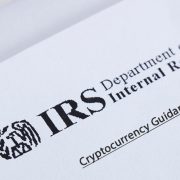Congressman Emmer Welcomes IRS Response On Guidelines For Reporting Virtual Currency
Congressman Emmer Welcomes IRS Response On Guidelines For Reporting Virtual Currency
On May 20, 2019 Congressman Tom Emmer (MN-R) announced in a press release that the IRS finally responded his letter that along with his fellow co-chairs of the Congressional Blockchain Caucus (current members being: Rep. Tom Emmer, Rep. Bill Foster (IL-D), Rep. David Schweikert (AZ-R) and Rep. Darren Soto (FL-D)), calling on the Internal Revenue Service to issue guidelines for reporting virtual currency on tax day.
Specifically, the response letter from, IRS Commissioner Charles P. Rettig stated, “I share your belief that taxpayers deserve clarity on basic issues related to the taxation of virtual currency transactions and have made it a priority of the IRS to issue guidance.” The letter outlined three areas that the IRS intends to publish guidelines for: acceptable methods for calculating cost basis, acceptable methods of cost basis assignment, and the tax treatment of forks.
Upon receiving this response letter from IRS, Congressman Emmer issued the following statement:
“I am glad to hear of the IRS’ plans to issue guidance on this important issue. Taxpayers deserve clarity on several basic questions regarding federal taxation of these emerging exchanges of value. I look forward to seeing their forthcoming proposal, and working together to serve the American taxpayers”.
Taxation Of Crypto Currency
Crypto currency transactions are apparently wildly taxable – far more so than investors may think. Although the IRS has not issued much formal guidance, the position of IRS is that any transaction involving virtual currency can trigger a taxable event including air drops and fork transaction as well as conversions or trades from one virtual currency to another virtual currency.
The IRS in 2014 issued Notice 2014-21 stating that it treats crypto currency as property for tax purposes. Therefore, selling, spending and even exchanging crypto for other tokens all likely have capital gain implications. Likewise, receiving it as compensation or by other means will be ordinary income.
Some would think that if bitcoin is property, trades should be tax deferred under the like-kind changes rues of I.R.C. §1031. Under that theory someone who owned Bitcoin could diversify their holdings into Ethereum or Litecoin, and plausibly tell the IRS it created no tax obligations. Unfortunately, the new Tax Cuts & Jobs Act of 2017 does away with that loophole making it clear that “like kind exchanges” which lets people swap an asset for a similar one without triggering a tax obligation are not available for non-real estate assets.
While Bitcoin receives most of the attention these days, it is only one of hundreds of crypto currencies. Everything discussed with regard to bitcoin taxation applies to all crypto currencies.
Here are the basic tax rules followed by IRS on specific crypto currency transactions:
- Trading crypto currencies produces capital gains or losses, with the latter being able to offset gains and reduce tax.
- Exchanging one crypto currency for another — for example, using Ethereum to purchase an altcoin — creates a taxable event. The token is treated as being sold, thus generating capital gains or losses.
- Receiving payments in crypto currency in exchange for products or services or as salary is treated as ordinary income at the fair market value of the coin at the time of receipt.
- Spending crypto currency is a tax event and may generate capital gains or losses, which can be short-term or long-term. For example, say you bought one coin for $500. If that coin was then worth $700 and you bought a $700 gift card, there is a $200 taxable gain. Depending on the holding period, it could be a short- or long-term capital gain subject to different rates.
- Converting a crypto currency to U.S. dollars or another currency at a gain is a taxable event, as it is treated as being sold, thus generating capital gains.
- Air drops are considered ordinary income on the day of the air drop. That value will become the basis of the coin. When it’s sold, exchanged, etc., there will be a capital gain.
- Mining crypto currency is considered ordinary income equal to the fair market value of the coin the day it was successfully mined.
- Initial coin offerings including certain forks do not fall under the IRS’s tax-free treatment for raising capital. Thus, they produce ordinary income to individuals and businesses alike.
Given the limited guidance by IRS, there are still tax positions that can be advocated or structured so that taxpayers dealing with crypto currency can defer gains and minimize taxes. That is why it is essential you seek qualified tax counsel.
Penalties For Filing A False Income Tax Return Or Under-reporting Income
Failure to report all the money you make is a main reason folks end up facing an IRS auditor. Carelessness on your tax return might get you whacked with a 20% penalty. But that’s nothing compared to the 75% civil penalty for willful tax fraud and possibly facing criminal charges of tax evasion that if convicted could land you in jail.
Criminal Fraud – The law defines that any person who willfully attempts in any manner to evade or defeat any tax under the Internal Revenue Code or the payment thereof is, in addition to other penalties provided by law, guilty of a felony and, upon conviction thereof, can be fined not more than $100,000 ($500,000 in the case of a corporation), or imprisoned not more than five years, or both, together with the costs of prosecution (Code Sec. 7201).
The term “willfully” has been interpreted to require a specific intent to violate the law (U.S. v. Pomponio, 429 U.S. 10 (1976)). The term “willfulness” is defined as the voluntary, intentional violation of a known legal duty (Cheek v. U.S., 498 U.S. 192 (1991)).
And even if the IRS is not looking to put you in jail, they will be looking to hit you with a big tax bill with hefty penalties.
Civil Fraud – Normally the IRS will impose a negligence penalty of 20% of the underpayment of tax (Code Sec. 6662(b)(1) and 6662(b)(2)) but violations of the Internal Revenue Code with the intent to evade income taxes may result in a civil fraud penalty. In lieu of the 20% negligence penalty, the civil fraud penalty is 75% of the underpayment of tax (Code Sec. 6663). The imposition of the Civil Fraud Penalty essentially doubles your liability to the IRS!
What Should You Do?
The IRS has not yet announced a specific tax amnesty for people who failed to report their gains and income from Bitcoin and other virtual currencies but under the existing Voluntary Disclosure Program, non-compliant taxpayers can come forward to avoid criminal prosecution and negotiate lower penalties.
With only several hundred people reporting their crypto gains each year since Bitcoin’s launch, the IRS suspects that many crypto users have been evading taxes by not reporting crypto transactions on their tax returns.
And now that like–exchange treatment is prohibited on non-real estate transactions that occur after 2017, now is the ideal time to be proactive and come forward with voluntary disclosure to lock in your deferred gains through 2017, eliminate your risk for criminal prosecution, and minimize your civil penalties. Don’t delay because once the IRS has targeted you for investigation – even if it is a routine random audit – it will be too late voluntarily come forward. Let the Bitcoin tax attorneys at the Law Offices Of Jeffrey B. Kahn, P.C. located in Orange County (Irvine), San Francisco Bay Area (including San Jose and Walnut Creek) and offices elsewhere in California get you qualified into a voluntary disclosure program to avoid criminal prosecution, seek abatement of penalties, and minimize your tax liability. Additionally, if you are involved in cannabis, check out what a cannabis tax attorney can do for you.










 Follow
Follow Follow
Follow